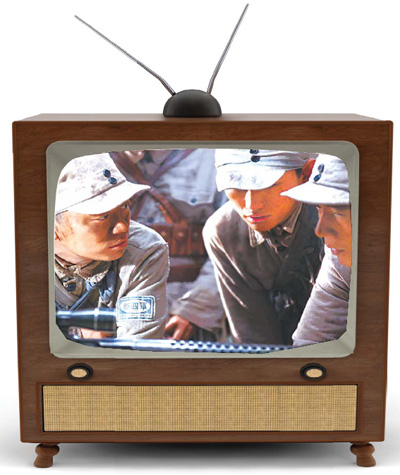
In living rooms throughout China, as families drink tea or nibble on watermelon seeds after dinner, the conversation will often turn to what soap operas they are going to watch that night.
"My mother washes all the dishes quickly right after dinner and sits on the sofa waiting for her must-see soap opera," says Xu Bingyu, 28, a white-collar worker in Beijing. "She will ask my father and me to watch with her."
The Xu family are among the hundreds of millions of Chinese who spend an average of three hours a day watching drama programs.
According to a new survey, dramas about everyday life are the most watched television programs in China ahead of reality TV, costume historical dramas, documentaries, news and sports shows.
Athough audiences have different preferences, depending on whether they are from north or south of China, they are all addicted to drama.
Tonight's must-see show for the Xu family is China Central Television's (CCTV), My Brother Shunliu, about a boy from the countryside who serves as a sniper during the War of Resistance Against Japanese Aggression (1937-1945).
According to CVSC-Sofres Media (CSM), a joint venture between Central Viewer Survey and Consulting Center and the Taylor Sofres Group, the first episode of the series received an initial rating share of 5.4 percent, rising to 8.3 percent on June 21, or 8.28 million viewers for that episode, just three days after it began showing.
"The sense of humor and heart-warming storylines caught our attention. It is not a traditional soldier drama, which is very serious," says Xu. "The hero's optimism and loyalty touched us."
The most popular shows are about real life of common people: a middle-aged factory worker loses his job, young urban professionals launch their own businesses, and tales about struggles between father and son.
"During the past few years, Chinese TV series have become close to people's daily lives," says Zhang Guoli, a mainland actor, director and producer, who has been in the TV and film industry for 20 years.

The multi-award winner says prime time TV (from 7 pm to 10 pm) is dominated mainly by soap operas.
Also known as the "King of Chinese TV", he has taken the role of emperor in various TV series and is one of the most productive and critically acclaimed actors in China.
During the past few years, Zhang has starred in some family-themed dramas, such as Golden Marriage (2007), which portrays a Chinese couple whose marriage lasts over 50 years; Brother (2008), which tells of the struggles of three brothers; and Big Life (2009), about an optimistic single-parent father.
"Chinese have this thirst for watching daily life," Zhang says. "They like gossip and these TV series are like peering into one of their neighbor's lives."
"Trivial family matters and ordinary people's lives attract millions of Chinese to spend their evenings, laughing and sniffing," scriptwriter Mai Tian says.